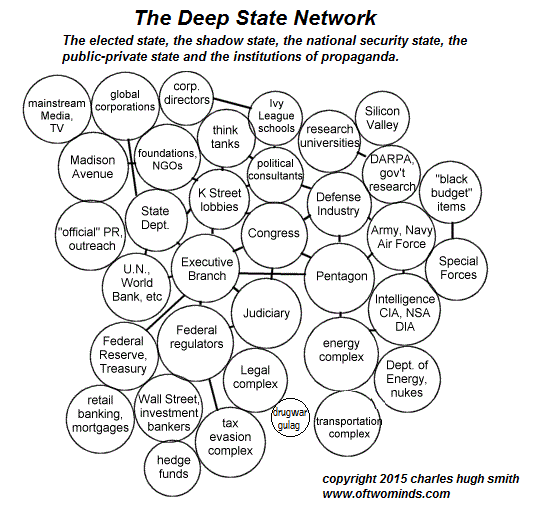
Authored by Charles Hugh Smith via OfTwoMinds blog,
What constitutes an impeachable offense?
Yesterday in The Internecine Deep State Conflict Moves to Stage Two I suggested that the conflict was heating up, a move confirmed by former Trump advisor Michael Flynn's guilty plea that he lied to the F.B.I. regarding his contact with Russian officials.
The case for impeachment now becomes clear: prosecutors will attempt to prove that Trump made contact with the Russians in violation of the Logan Act, which forbids private citizens from dealing in matters of state with foreign governments.
According to the Wikipedia entry on The Logan Act, To date, only two people have ever been indicted for violating the Act's provisions. However, no person has ever been prosecuted for alleged violations of the Act.
(There are of course other potential charges, which we will learn more about as legal commentators across the spectrum weigh in.)
Question #1: can prosecutors provide evidence that shows beyond reasonable doubt that Trump violated the Logan Act before taking office?
Question #2: is this an impeachable offense? That will be decided by the House of Representatives, which can pass a motion of impeachment on a simple majority: Impeachment of the president, explained.
The case then goes to trial in the Senate, where impeachment requires a 2/3 majority.
Clearly, impeachment is not only a legal process, it is a political process in which partisanship plays a role. The definition of what constitutes an impeachable offense is not well-defined in the Constitution, with treason and accepting bribes being two examples.
It's not too difficult to imagine the Supreme Court being called upon to issue a ruling, given the history of political/legal crises raising issues that must be addressed by the Supreme Court. Examples include the 2000 presidential election/ballot-counting controversy in Florida, and the 1973 Saturday Night Massacre in the Watergate scandal.
Question #3: Can Trump be caught in a lie like Flynn?
It's common knowledge that public figures are often felled not by their initial misdeeds but by the lies and cover-ups issued to cloak the original misdeeds. If prosecutors can pin lies on Trump that are equivalent to what they pinned on Flynn, then we return to Question #2: is this an impeachable offense?
Impeachment has been in the political winds since the 2016 election. Opinions on the likelihood and the consequences of impeachment are of course varied, for example, What’s worse than leaving Trump in office? Impeaching him. (WaPo)
Meanwhile, stories that Trump is becoming increasingly erratic are opening another path to Trump's removal via charges of mental instability: Trump Is Cracking Up (New York Times).
All of which leads to Question #4: to what degree does governance grind to a halt should the crisis become the dominant focus of the nation?
Those of us who lived through the Watergate years recall that the crisis (more a process than an event) crippled governance and policy on many levels and led to sweeping reforms of numerous federal institutions.
Question #5: who benefits from the crisis, regardless of its ultimate outcome? Certainly those within the Deep State who cannot abide Trump at the head of the Executive Branch have accomplished a major goal, which is bringing legal culpability (guilty pleas, etc.) into Trump's inner circle, where maximum damage can be done, up to and including impeachment.
Another camp might benefit from the chaos, seeing opportunity as Trump partisans and opponents wage war on each other.
Clearly, the Trump administration has just absorbed a salvo of torpedoes, and secondary explosions are still cooking off below decks. The goal of the Deep State supporters of the administration can't be mere political survival; the goal must be to reach a resolution quickly enough to maintain some measure of consent of the governed.
The anti-Trump camp knows the damage done by the passage of time: the longer Trump and his circle are on the defensive, the greater the damage inflicted, even if his presidency survives more or less intact.
In my view, the most cogent context is not partisan politics, but the battle for the upper hand in the Deep State. Those of us on the outside of these opaque, for-all-the-marbles battles only see the shadows cast by the media circus; we are left with the unenviable task of attempting to read between the lines of scripted PR spin from every Deep State camp with a stake in the outcome, which means all of them.
Just for reference, here is my first essay on the topic: Is the Deep State Fracturing into Disunity? (March 14, 2014)
* * *
If you found value in this content, please join me in seeking solutions by becoming a $1/month patron of my work via patreon.com. Check out both of my new books, Inequality and the Collapse of Privilege ($3.95 Kindle, $8.95 print) and Why Our Status Quo Failed and Is Beyond Reform ($3.95 Kindle, $8.95 print, $5.95 audiobook) For more, please visit the OTM essentials website.